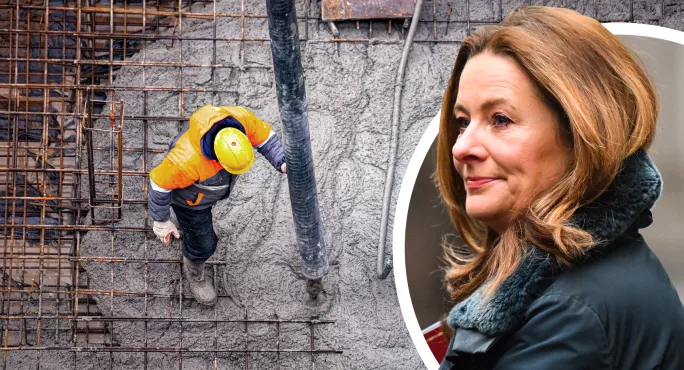RAAC: Keegan apologises for off-camera comments

Education secretary Gillian Keegan has apologised after she was recorded swearing and suggesting she deserved praise for her handling of the RAAC crisis in schools.
Ms Keegan was caught on camera by ITV after an interview today saying: “Does anyone ever say, you know what, you’ve done a fucking good job, because everyone else has sat on their arse and done nothing?”
It comes after mounting controversy following a Department for Education announcement that schools with RAAC (reinforced autoclaved aerated concrete) would need to close buildings over safety fears - made just days before the start of the academic year.
Labour and the Liberal Democrats condemned her comments and urged her to apologise to families. Speaking to the BBC later on today, Ms Keegan apologised for her “choice language”.
- RAAC: Sunak ignored ‘critical risk to life’ warnings, says ex DfE boss
- Ofsted: Watchdog to consider inspection delay for RAAC schools
- RAAC: Which schools are affected?
Reacting to the initial comments, shadow schools minister Stephen Morgan said: “This is a staggering admission that Rishi Sunak and the Conservatives have done nothing to address a problem that they have known about for years. The education secretary has displayed staggering arrogance for saying she deserves a pat on the back for the chaos that is gripping our schools on their watch.”
Liberal Democrat spokesperson Munira Wilson added that Ms Keegan must be “living on another planet” for expecting thanks after having the “start to the school year wrecked on her watch”.
The minister’s comments came at the conclusion of an interview with ITV’s Daniel Hewitt, in which she said he had been “pressing me quite hard” and claimed he was “making out it was all my fault”.
In her apology, the education secretary did not say who she believed was “sat on their arse”.
The prime minister’s official spokesman said: “I think that the language used obviously is not acceptable. It is right that the education secretary has apologised for that.
“But at the front of parents’ minds will be the situation in their schools and I think that is what they will want to hear more about.”
Meanwhile, several public service union heads have come together to write to the education secretary for urgent answers on the RAAC crisis.
Union general secretaries, including Geoff Barton from the Association of School and College Leaders; the NAHT school leaders union’s Paul Whiteman; Daniel Kebede, the new leader of the NEU teaching union; and Dr Patrick Roach of NASUWT; wrote: “Foremost in our minds is the safety of the school community. It cannot be right that school leaders and their teams are charged with making decisions about the immediate risk of harm if they discover or are concerned that RAAC is present on their site.
“They do not have the relevant expertise to make such assessments. Members of our unions, particularly in leadership positions, may be faced with calls from staff or the public to evacuate the site or parts of that site if there is any uncertainty whatsoever.”
Union bosses asked how the DfE would support school leaders who weren’t confident that they could accurately make an assessment as to whether their school had suspected RAAC when returning the questionnaires.
They also called for the rollout of capital funding to be sped up, or “schools could have ceiling props and mobile classrooms for years to come”.
“Our members are managing the anxiety of parents and carers on behalf of government. The least they are entitled to know, with confidence, is how they ended up in this situation when the government knew of the risks long ago,” the letter adds.
Mr Barton said earlier today: “We are also concerned about reports that the funding for this issue will come from the DfE’s existing capital budget. It is likely that this would put pressure on the existing programme of repairs and refurbishment. Capital funding has been cut by 50 per cent in real terms since 2010 and needs to be increased rather than squeezed further.”
Former DfE permanent secretary Jonathan Slater claimed that Rishi Sunak cut the Schools Rebuilding Programme from 100 a year to 50 when he was chancellor, despite Mr Slater estimating that there was a need to rebuild 300 to 400 schools a year. The prime minister has since defended himself, with his spokesperson saying he had committed in 2020 to funding the rebuilding of 500 schools over the next decade.
The former president of the Institute of Structural Engineers, Dr John Roberts, appeared on Radio 4 this afternoon and said he didn’t think RAAC should ever have been used in permanent buildings. He added: “I think you need to have quite an amount of structural engineering knowledge to identify this material. It’s not normally directly visible.”
Ms Keegan has said that just over 90 per cent of schools had returned questionnaires on whether they suspect they have RAAC. That leaves about 1,500 schools that have yet to reply.
With union leaders raising concerns about the pressure put on schools to look for suspected RAAC themselves, the DfE has confirmed that schools can revisit their questionnaire responses if they don’t feel confident in their previous assessment.
You need a Tes subscription to read this article
Subscribe now to read this article and get other subscriber-only content:
- Unlimited access to all Tes magazine content
- Exclusive subscriber-only stories
- Award-winning email newsletters
Already a subscriber? Log in
You need a subscription to read this article
Subscribe now to read this article and get other subscriber-only content, including:
- Unlimited access to all Tes magazine content
- Exclusive subscriber-only stories
- Award-winning email newsletters



